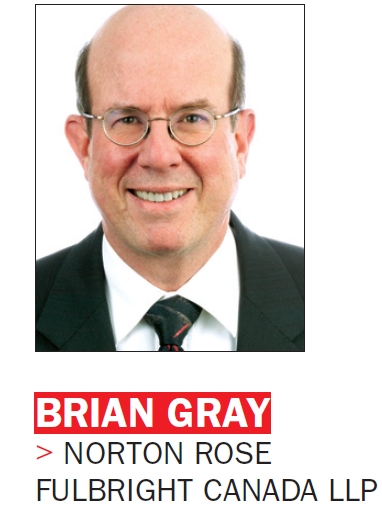Elimination of prior-use requirement will make it easier for trademark registrants to press their claims
By Julius Melnitzer
CANADA'S BUSINESS community and most – but not all – of the country's IP Bar have united in opposition to Ottawa's plan to introduce fundamental changes to longstanding trademark law.
The amendments were in the Economic Action Plan 2014 Act (Bill C-31), which implements the latest budget. Most significantly, they would remove previous use of a trademark, in Canada or elsewhere, as a requirement for registration. The changes would align Canada with other jurisdictions, including the EU, where trademark rights are based on registration alone.
“The elimination of use as a requirement for registration will increase the cost of doing business and create opportunities for trademark trolls,” says Scott Smith, Director of Intellectual Property and Innovation Policy at the Canadian Chamber of Commerce.
A prominent group of Canadian trademark lawyers have also voiced their opposition in a brief authored primarily by Daniel Bereskin of Bereskin & Parr LLP. The signatories include lawyers from: Blake, Cassels & Graydon LLP; Smart & Biggar LLP; Dimock Stratton LLP; Bennett Jones LLP, Osler, Hoskin & Harcourt LLP; Norton Rose Fulbright Canada LLP; Robic, LLP; Chitiz Pathak LLP; Deeth Williams Wall LLP; Miller Thomson LLP; Fogler Rubinoff LLP; Borden Ladner Gervais LLP; Clark Wilson LLP; and Sim & McBurney/Sim Lowman Ashton & McKay LLP.
Bereskin argues that the proposed legislation will require more investigations concerning the right to use a new trademark, more difficult opinions requiring clients to accept risk, more oppositions, more non-use proceedings, more appeals from CIPO proceedings and more litigation. “The changes undermine the foundation of our trademark law,” he says. “They threaten to abandon more than 140 years of trademark jurisprudence and may invite a constitutional challenge.”
Interestingly, Gowling Lafleur Henderson LLP, which boasts the largest trademark portfolio of any law firm in Canada, did not sign the brief. Kelly Gill, head of the firm's trademark group, said his group did not agree with the argument that the impugned amendments were unconstitutional. “There are certainly issues with the changes,” Gill said. “Overall, however, the submissions struck us as a bit reactionary.”
For its part, the government says the new law is intended to abide by international agreements. But Brian Gray in Norton Rose's Toronto office, who signed the Bereskin brief, maintains that the government's position is specious with regard to the elimination of use. “The US has signed on to Madrid and made no changes to its use requirements,” he says.
By Julius Melnitzer
CANADA'S BUSINESS community and most – but not all – of the country's IP Bar have united in opposition to Ottawa's plan to introduce fundamental changes to longstanding trademark law.
The amendments were in the Economic Action Plan 2014 Act (Bill C-31), which implements the latest budget. Most significantly, they would remove previous use of a trademark, in Canada or elsewhere, as a requirement for registration. The changes would align Canada with other jurisdictions, including the EU, where trademark rights are based on registration alone.
“The elimination of use as a requirement for registration will increase the cost of doing business and create opportunities for trademark trolls,” says Scott Smith, Director of Intellectual Property and Innovation Policy at the Canadian Chamber of Commerce.
A prominent group of Canadian trademark lawyers have also voiced their opposition in a brief authored primarily by Daniel Bereskin of Bereskin & Parr LLP. The signatories include lawyers from: Blake, Cassels & Graydon LLP; Smart & Biggar LLP; Dimock Stratton LLP; Bennett Jones LLP, Osler, Hoskin & Harcourt LLP; Norton Rose Fulbright Canada LLP; Robic, LLP; Chitiz Pathak LLP; Deeth Williams Wall LLP; Miller Thomson LLP; Fogler Rubinoff LLP; Borden Ladner Gervais LLP; Clark Wilson LLP; and Sim & McBurney/Sim Lowman Ashton & McKay LLP.
Bereskin argues that the proposed legislation will require more investigations concerning the right to use a new trademark, more difficult opinions requiring clients to accept risk, more oppositions, more non-use proceedings, more appeals from CIPO proceedings and more litigation. “The changes undermine the foundation of our trademark law,” he says. “They threaten to abandon more than 140 years of trademark jurisprudence and may invite a constitutional challenge.”
Interestingly, Gowling Lafleur Henderson LLP, which boasts the largest trademark portfolio of any law firm in Canada, did not sign the brief. Kelly Gill, head of the firm's trademark group, said his group did not agree with the argument that the impugned amendments were unconstitutional. “There are certainly issues with the changes,” Gill said. “Overall, however, the submissions struck us as a bit reactionary.”
For its part, the government says the new law is intended to abide by international agreements. But Brian Gray in Norton Rose's Toronto office, who signed the Bereskin brief, maintains that the government's position is specious with regard to the elimination of use. “The US has signed on to Madrid and made no changes to its use requirements,” he says.
Lawyer(s)
Firm(s)
Bereskin & Parr LLP
Blake, Cassels & Graydon LLP
Smart & Biggar
Bennett Jones LLP
Norton Rose Fulbright Canada LLP
Osler, Hoskin & Harcourt LLP
ROBIC
Chitiz Pathak LLP
Deeth Williams Wall LLP
Miller Thomson LLP
Fogler, Rubinoff LLP
Borden Ladner Gervais LLP (BLG)
Clark Wilson LLP
Marks & Clerk Canada
Gowling WLG





